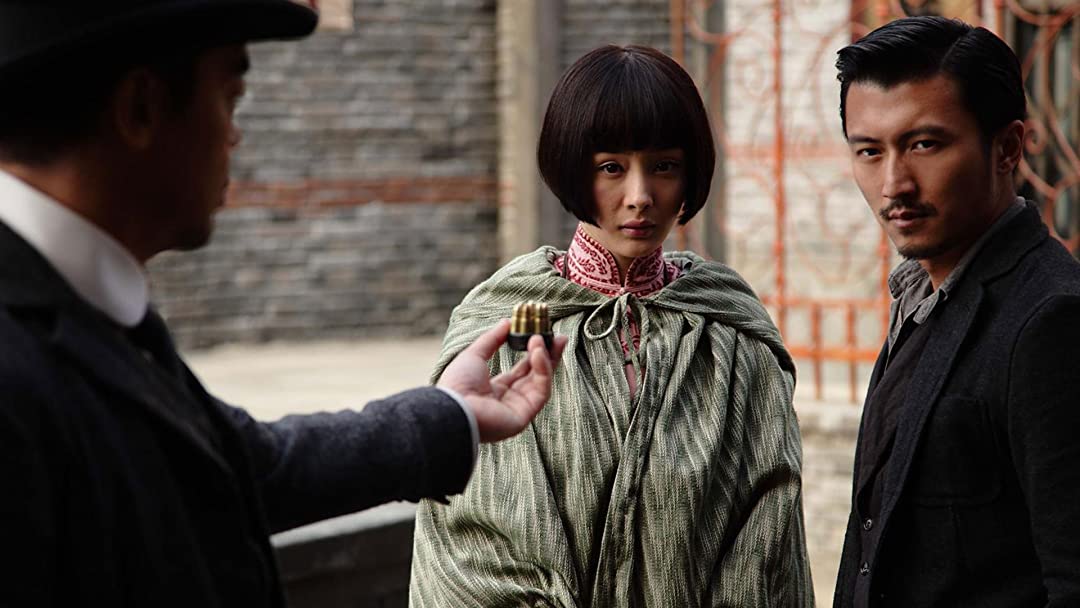By Chlotrudis Independent Film Society
Rating: 4 cats
Director: Chi-Leung Law
Starring: Jing Boran | Lau Ching-wan | Li Kai-chi | Nicholas Tse | Wu Gang | Yang Min | Yumiko Cheng

Original language title: Xiao shi de zi dan
Country: china, hong_kong
Year: 2012
Running time: 108
IMDB: http://www.imdb.com/title/tt2106741/
Jason says: “A friend of mine recently lamented on Twitter about the demise of the mystery movie in Hollywood, and the best thing I could point him to was a Chinese movie that will likely be more considered a martial arts flick than a detective story. I’m not certain the mystery is still a popular genre with Chinese audiences – like DRAGON, THE BULLET VANISHES (XIAO SHI DE ZI DAN) could be marketed as an action movie – but their filmmakers are giving us some good whodunits.
“Our sleuth in this case is Song Donglu (Lau Ching-wan), a prison guard in 1920s/1930s China who has made a habit out of investigating prisoners’ protestations of innocence even if he has to put his neck in a noose to figure out what sort of ligatures in creates in those early days of forensics. Someone figures out that he’d be better used preventing wrongful convictions than overturning them, and makes him a detective in Tianching. For his first case, he’s teamed with Captain Guo Zhui (Nicholas Tse), whose quick draw with a gun disguises a keen mind, to investigate the murder of a foreman at the local munitions factory owned by Mr. Ding (Li Kai-chi), suspicious because the bullet seems to have disappeared after killing the victim. With plenty of suspects/potential victims – including Wang Hai (Wu Gang), whose skill with a gun may match Guo’s, and the factory workers who tell local fortune teller ‘Little Lark’ (Yang Mini) a ghost story – Song, Guo, and junior partner Xaiwu (Jing Boran) have their work cut out for them.
“Mystery stories were different back in the day, before the likes of CSI made everyone more obsessed with DNA testing than uncovering motives and untangling alibis. THE BULLET VANISHES is a bit anachronistic in some regards – the detectives spend more time consulting lady coroner Li Jia (Yumiko Cheng) than may have been likely in the Christie Age, and that’s not the only way Guo and Song obsess over physical evidence versus shoe leather. It’s still a fun throwback in other ways, with the ultimate solution coming from asking the question ‘who benefits?’ The puzzle of the phantom bullets is a nifty one; too, clever enough for this member of the audience to smile when the detectives figure it out.
“It’s a beautiful period piece, too: The detectives wear sharp suits and nice hats, while Li Jia and Little Lark have Louise Brooks haircuts. The industrializing city and factory are made of strong iron that hasn’t yet had a chance to rust, and while the music may be a bit of a cliché – the score is reminiscent of swing with a lot of plucked ‘oriental’ strings in the mix – it undeniably helps set time, place, and mood. It doesn’t change much even when Guo Zhui and Wang Hai threaten to turn the movie into a western as their hands twitch near their holsters, but does shift to the piano when Song’s description of a murder that happened several years ago is done as a perfect (and darkly hilarious) silent-movie pastiche.
“I won’t lie; it would be nice if the movie stopped when the mystery appeared to be wrapped up the first time. Aside from being a firm believer in not leaving a whole lot of time between a nicely-executed final action scene and the credits rolling, a simple explanation that hits the important points is often more satisfying than a complicated one that explains everything. There are a few other issues to quibble about, too, but they’re in the last ten minutes of a mystery movie and I’m not jerk enough to do it publicly.
“On the other hand, one way to measure the success of a detective story is how much the audience would like to see the sleuth solve more cases, and more of Song Donglu and Guo Zhui would be welcome. For some, Donglu may come across as a Chinese Sherlock Holmes, but those who have seen some of Lau Ching-wan’s other work are going to be reminded of Bun Chan-kwai from MAD DETECTIVE. Song isn’t nearly so insane as Bun, but he’s quite impulsive and mildly tortured, though Lau doesn’t chew the scenery, instead opting for an amused self-awareness and dry wit. Nicholas Tse does a nice job of making Guo into Song’s equal; he’s not eccentric but he is driven, and Tse does a nice job of presenting that as focus rather than just intensity. They make great, evenly matched, on-screen partners (so evenly-matched that Jing Boran is needed for Watson duty, which he handles well), the pairing working in-story and with the audience from the moment they meet. Yang Mini and Yumiko Cheng are both satisfactory as the ladies helping them figure things out from opposite angles, and Liu Kai-chi is suitably larger than life as the most obvious villain.
“There is, of course, even more gunplay than a murder in a munitions factory requires and the odd unnecessary explosion; it’s the twenty-first century on this side of the screen and that’s how it works these days. Look beyond them, though, and you’ve got a fun detective story, and we can always use more of those, even if they are made in China. 4 cats
“Seen 1 September 2012 in AMC Boston Common #12 (first-run, Sony Digital 4K).”
